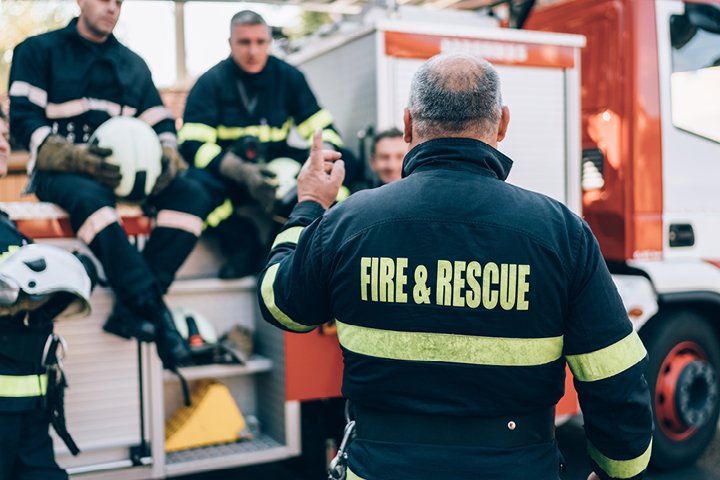- Go to homepage
- Course areas
- Maritime
- Statement of Attainment in Basic Fire Fighting (STCW)

OverviewAbout this course
Act with confidence in the event of a fire on a vessel and work with your team to ensure the safety of everyone onboard. Identify potential risks, maintain your equipment and run fire watches to prevent further outbreaks.
OutcomesWhat you'll gain
Learning outcomes
Through a mixture of theory and practical course work, learn to:
Actively prevent fires onboard a vessel by identifying and rectifying hazards
Choose tactics to combat and extinguish fires
Communicate with your team during firefighting operations
Maintain personal protective equipment (PPE) and firefighting equipment
Preserve fire scenes for investigation and run fire watches to prevent further outbreaks
Course outcomes
Gain practical experience and develop specialist skills that give you an advantage in the job market.
A nationally accredited Statement of Attainment
Certificate of Fire Prevention and Fire Fighting (AMSA approved) (STCW Reg VI/1 and Code Section A-VI/1, Table A-VI/1-2)
Ability to manage shipboard fire-fighting teams during fire emergencies including fire prevention and fire suppression activities on a vessel
SuitabilityIs this course right for you?
Entry requirements
Some courses require evidence of previous experience or study before you can enrol
- There are no entry requirements for this qualification. You can enrol today.
Completion requirements
During your study you’ll need to provide your teacher with the following evidence:
100% attendance, full participation and completion of all practical exercises, is required
Entry recommendations
To be prepared for this course, we recommend that you have:
Awareness of the Australian Maritime Safety Authority (AMSA) certification requirements
The ability to attend practical assessment sessions on campus and/or at related facilities
Suitable clothing and personal protective equipment (PPE) for your assessments
Contact with your prospective campus for practical assessment locations, dates and clothing/PPE requirements
TAFE NSW is committed to meeting the learning needs of every community. Meeting these needs can mean there are additional entry requirements at different campus locations. Check your preferred location for further requirements. If you need help preparing for study, contact us to find out how we can support you.
PathwaysFuture career and study options
Career pathways
Our graduates go onto roles like: watchkeeper deck officer, master (up to 500 GT), chief mate and master unlimited.
Licensing
The maritime industry is regulated by the Australian Marine Safety Authority (AMSA). AMSA sets specific requirements for each maritime qualification to ensure you are ready to join the industry. The Statement of Attainment in Safety Certification Training Skill Set will provide you with the first step towards the Certificate of Safety Training (CoST), in addition to your ability to fulfil all other AMSA requirements. CoST is the first international qualification you need to become a seafarer. There are numerous short courses under the International Convention on Standards of Training, Certification and Watchkeeping for Seafarers (STCW) that establish the basic requirements for training, certification and watchkeeping for seafarers on an international level. It's essential that you review the criteria for a Certificate of Safety Training on the AMSA website. Visit the link for more information.
Study pathways
Take your study further with other courses offered at TAFE NSW:
Previous study0 Courses
Begin here to gain experience and confidence in this study area.
The Statement of Attainment in Basic Fire Fighting (STCW) does not have any pre-requisite courses.
Further study3 Courses
Advance your skills to take your career to the next level
Related study2 Courses
Strengthen your expertise and gain specialist skills to expand your employability.
Your experience counts
At TAFE NSW, we recognise your previous study and work experience. You can apply for recognition of prior learning or a credit transfer with any of our courses. If you're successful you'll get your qualification faster.
UnitsUnits taught in this course
Core units are central to the job outcomes of a particular industry or occupation. These are the units industry has agreed are essential to be capable and qualified at a particular study level.
Contribute to fire prevention and firefighting (basic firefighting)MARF035
TAFE NSW servicesFacilities and support
TAFE NSW provides support services across all campus locations and online. Whatever your needs or circumstances, we have the people, resources, counselling and facilities to support you in focusing on your studies.
TAFE NSW Disability Support Service
TAFE NSW Language, Literacy and Numeracy (LLN) support
TAFE NSW Aboriginal Support; Learner support (ABE)
TAFE NSW Careers, Counselling and Pathways Service
TAFE NSW Libraries
Scholarship programs – be supported as you explore your talents and fulfil your potential
Read&Write literacy and study support software is available free for all TAFE NSW students to use while studying on campus and at home
LinkedIn Learning – an online resource which offers innovative courses and tutorials to improve your personal and professional skills
Student associations – get social with our student community